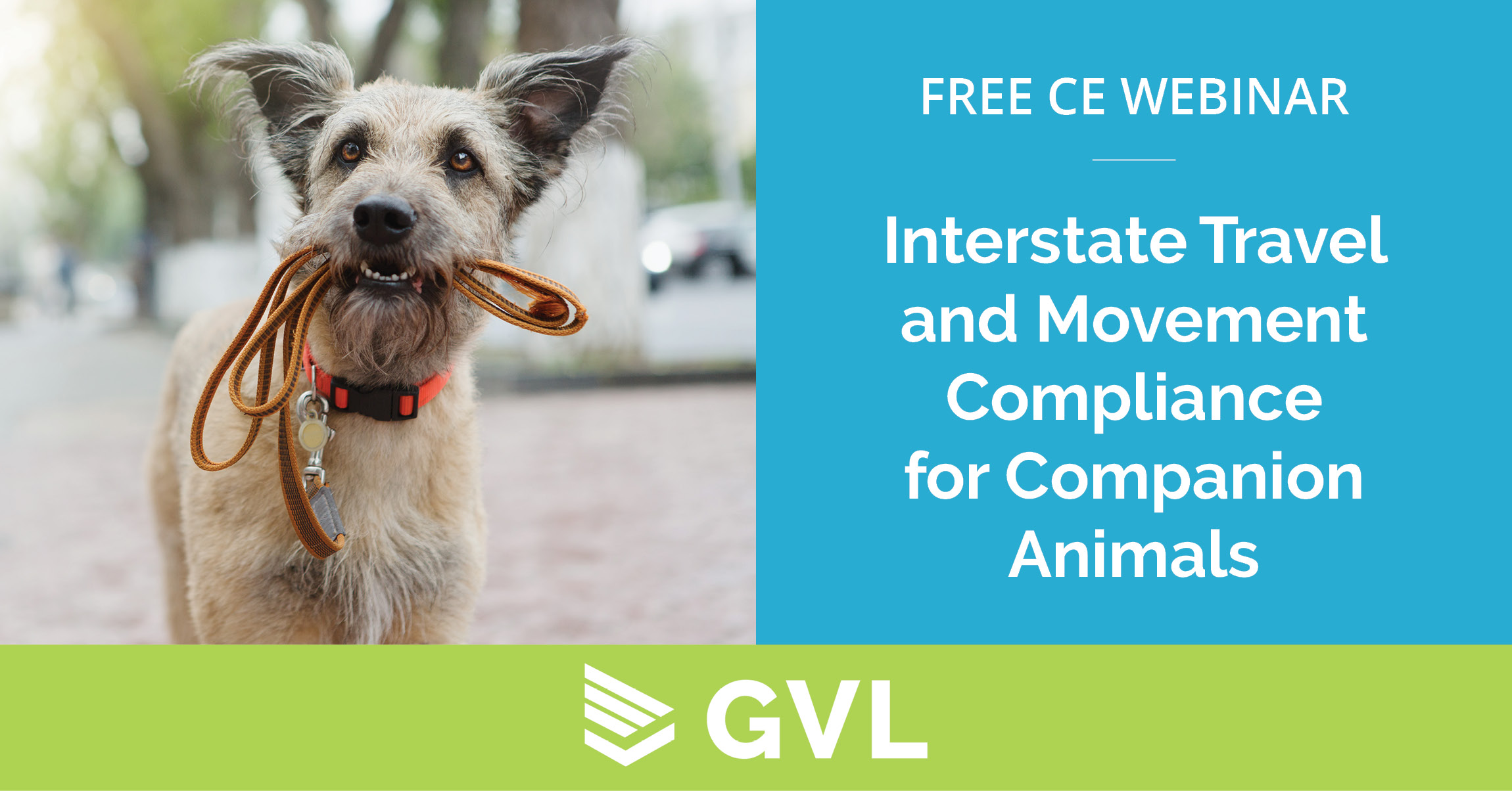In our recent webinar, Interstate Travel and Movement Compliance for Companion Animals, Dr. Nelva Bryant discussed navigating the current rules and regulations around companion animal movement throughout the US and Internationally.
Here, we’re sharing resources and summarizing Q&A from the webinar. If you still have questions, please contact us and we’ll add them to this list.
Questions and answers from the webinar
There were many questions submitted by webinar attendees, and not all of them could be addressed in the hour-long session. We have compiled the questions and worked with Dr. Bryant to provide answers to the best of our knowledge. Click on a topic to expand the Q&A.
Airline Travel
Providing any medication that causes sedation is not recommended. According to the AVMA, sedation is not advised for air travel of dogs and cats. Sedation impairs the natural ability to balance equilibrium, brace to prevent injury, and impairs the ability of the respiratory and cardiovascular systems to respond to altitude pressures. The most important thing is for the pet to be acclimated to the crate to ease the stress of air travel.
When traveling via aircraft, please review the pet travel policies for your airline. They will provide the specific requirements for air travel in-cabin or via cargo. If traveling in-cabin, the pet must be small enough to fit in an approved carrier beneath the seat in front of you.
Yes, each airline will have their own pet travel policies regarding temperature. Please review the pet travel policies for your airline.
Considerable thought should be taken regarding the signage of an acclimation statement. When traveling via cargo, an airline requires an acclimation statement if the temperature is below 45 deg F. This is a USDA APHIS animal welfare requirement, and the lowest temperature for travel must be determined by the issuing accredited veterinarian. The accredited veterinarian is asked to determine the lowest temperature between 20 – 45 deg F that a pet could travel via cargo. Being that most pets reside inside households and are not routinely exposed to temperature extremes, there’s no way of knowing whether a pet is acclimated to temperatures between 20-45 deg F. Sign with care and consider what you are attesting to.
Yes, they are allowed to travel in-cabin.
Yes, each airline will have their own pet travel policies regarding embargoed breed. Please review the pet travel policies for your airline.
Airline Pet Policy Information
International Travel
Each country can require the use of their specific animal health certificate. The USDA Pet Travel Website is a great resource that provides the dog and cat entry requirements for most destinations.
You must comply with the pet entry requirements of the destination country. If microchipping is required prior to the rabies vaccination, then you will have to revaccinate the pet against rabies to meet their entry requirements. USDA could reject endorsement if you do not meet the entry requirements. Additionally, if the pet arrives to the destination without meeting the entry requirements, it can be denied entry.
When traveling internationally via aircraft, you must comply with the pet entry requirements of the destination country and the airline. The airline will require a certificate of veterinary inspection to meet USDA animal welfare requirements. Thus, I recommend that you provide the required documents for the airline and the destination country.
Certificates of Veterinary Inspection (CVIs)
Each state or country will have their own pet entry requirements which may include an import permit. The USDA Pet Travel Website is a great resource that provides the dog and cat entry requirements for most destinations. As the issuing accredited veterinarian, you must ensure pets meet the entry requirements for the destination state or country.
You will need to contact the state veterinarian’s office for the state of destination to obtain a permit number.
Great question. A CVI attests that the animal does not have evidence of a infectious/communicable disease. Thus, a CVI should not be issued if a pet has a vector borne disease. Once cleared of the disease, a CVI can be issued. For further questions regarding the signage of a CVI, contact your Area Veterinarian in Charge (AVIC).
No, that is considered fraud. Accredited veterinarians are commissioned to ensure the health of the Nation’s livestock and animal population and protect public health. All required examinations, diagnostic testing, and documents to meet domestic and international requirements must be completed by an accredited veterinarian. Please review USDA Veterinary Accreditation Program and request to become an accredited veterinarian to provide accredited services.
CVIs should be mailed to the state of destination, if you are using a paper form. Before completing a paper CVI, ensure that the state of destination accepts the form that you are using. CVIs created through a electronic service such as GVL are automatically submitted to the state of origin and destination.
The destination address is where the animal will reside in the destination state or country.
Since the APHIS 7001 is readily available on-line and lacks the ability to ensure validity, most states do not accept the use of the APHIS 7001 form for domestic travel. When completing a certificate of veterinary inspection for domestic travel, the accredited veterinarian must research the pet entry requirements for the destination state. State-specific CVI are available or you can find a CVI provider to fulfill the requirements for travel.
Yes, scanning the CVI into the medical record seems an appropriate way to store the information.
APHIS 7001 Form
Since the APHIS 7001 is readily available on-line and lacks the ability to ensure validity, most states do not accept the use of the APHIS 7001 form for domestic travel. When completing a certificate of veterinary inspection for domestic travel, the accredited veterinarian must research the pet entry requirements for the destination state. State-specific CVI are available or you can find a CVI provider to fulfill the requirements for travel. A list of states that are currently no longer accepting the APHIS 7001 form can be found here.
Rabies Vaccination Certificates
Dogs and cats must be vaccinated and revaccinated against rabies according to product label directions. Please check with the manufacturer for information regarding the expiration of the rabies vaccination and their revaccination recommendations.
Please contact your State Public Health Veterinarian to resolve this issue.
Microchips
Yes, the ISO compliant microchip number must be affixed on all the documents required for international travel.
Please contact the manufacturer and find out who that particular chip was sold to, and then contact that location for the date of insertion.
Emotional Support Animals (ESAN)
Emotional support animals may travel, however they are deemed personal pets and pet owners will incur a fee for their transport. Depending upon the size of the pet, it may travel in-cabin or via cargo. Please check with the airline for their policies for pet transport in-cabin and via cargo.
Breed Representation
Misrepresentation of a breed could become a detriment to the safety and welfare of a pet during air travel. If the pet appears to be a breed that does not tolerate air travel very well, please educate the client of the risks associated with air travel.
As an accredited veterinarian, you are responsible for properly identifying animals and recording the identification on the CVI. It is essential to be able to positively identify animals that you have listed on official documents.
CDC Suspension of Dogs Coming from High-Risk Rabies Endemic Countries
Please reference the CDC website for information on the countries that are considered high risk for rabies.
GVL Platform
Yes, the GVL platform can be used to create international travel certificate packages, including international health certificates. For more information on international travel certificate packages, visit our website.
Your clients can create and access their MyVetLink accounts from MyVetLink.com.
Yes, veterinary technicians can have access to your GVL account to populate a CVI with client and animal information for the doctor to review and sign.
Yes, GVL digital health certificates (CVIs) are accepted in all 50 states as well as the US territories.
Yes, GVL CVIs and International Health Certificates can be downloaded as PDFs and sent to VEHCS for endorsement for international travel.
Yes, rabies certificates for dogs and cats can be created through the GVL platform. When logged into GVL, click Create in the upper right corner and select Rabies certificate to get started.
No, a CVI cannot be edited once it has been signed by the veterinarian because it is an official regulatory document. The CVI would need to be voided and a new one issued to make any changes.
To delete custom remarks saved to your GVL account you will need to clear your browsing history and cache and cookies through your web browser.
The GVL platform stays up to date with current international travel requirements. We provide a travel timeline with information based on the species and destination selected and will also link to relevant sites or documents when necessary.
There are two pricing plans for the GVL platform. The pay as you go plan allows you to pay for certificates as you create them. On this plan, CVIs, EIAs, and VFDs, are $16/certificate and International Travel Packages are $65/package. The monthly subscription plan is $35.95/mo with reduced certificate fees of $5.50/certificate for CVIs, EIAs, and VFDs and $50/certificate for International Travel Packages. You can find additional information here.
Want to watch the webinar online?
The live webinar was recorded and can be viewed online. You will need to register to view the webinar, even if you had previously registered for the live webinar.
If you would like to earn CE credit, you will also need to take a short quiz after the webinar, linked below.
(If you already attended the live webinar for at least 50 minutes and requested CE, a certificate was emailed to you.)

